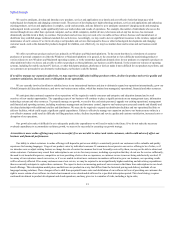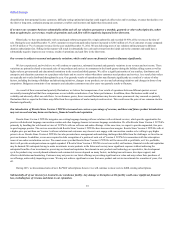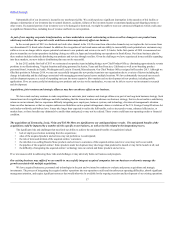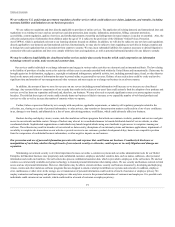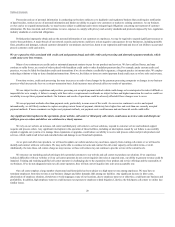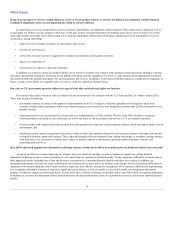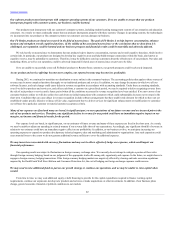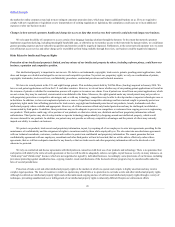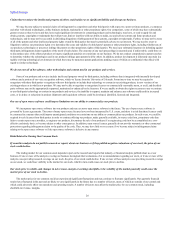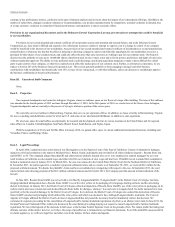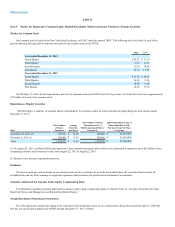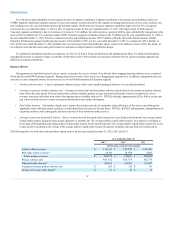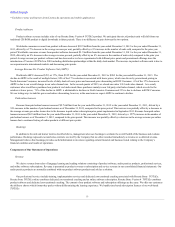Rosetta Stone 2013 Annual Report Download - page 26
Download and view the complete annual report
Please find page 26 of the 2013 Rosetta Stone annual report below. You can navigate through the pages in the report by either clicking on the pages listed below, or by using the keyword search tool below to find specific information within the annual report.
Table of Contents
against software piracy, we lose significant revenue due to illegal use of our software and from counterfeit copies of our software. If piracy activities increase, it
may further harm our business.
We also expect that the more successful we are, the more likely that competitors will try to illegally use our proprietary information and develop products
that are similar to ours, which may infringe on our proprietary rights. In addition, we could potentially lose future trade secret protection for our source code if
any unauthorized disclosure of such code occurs. The loss of future trade secret protection could make it easier for third parties to compete with our products
by copying functionality. In addition, any changes in, or unexpected interpretations of, the trade secret and other intellectual property laws in any country in
which we operate may compromise our ability to enforce our trade secret and intellectual property rights. Costly and time-consuming litigation could be
necessary to enforce and determine the scope of our confidential information and trade secret protection. If we are unable to protect our proprietary rights or if
third parties independently develop or gain access to our or similar technologies, our business, revenue, reputation and competitive position could be harmed.
Third-party use of our trademarks as keywords in internet search engine advertising programs may direct potential customers to competitors'
websites, which could harm our reputation and cause us to lose sales.
Competitors and other third parties, including counterfeiters, purchase our trademarks and confusingly similar terms as keywords in internet search
engine advertising programs and in the header and text of the resulting sponsored link advertisements in order to divert potential customers to their websites.
Preventing such unauthorized use is inherently difficult. If we are unable to protect our trademarks and confusingly similar terms from such unauthorized
use, competitors and other third parties may continue to drive potential online customers away from our websites to competing and unauthorized websites,
which could harm our reputation and cause us to lose sales.
Our trademarks are limited in scope and geographic coverage and may not significantly distinguish us from our competition.
We own several U.S. trademark registrations, including registrations of the and
trademarks, hold common law trademark rights and have trademark applications pending in the U.S. and abroad for additional trademarks. Even if federal
registrations and registrations in other countries are granted to us, our trademark rights may be challenged. It is also possible that our competitors will adopt
trademarks similar to ours, thus impeding our ability to build brand identity and possibly leading to customer confusion. In fact, various third parties have
registered trademarks that are similar to ours in the U.S. and overseas. We could incur substantial costs in prosecuting or defending trademark infringement
suits. If we fail to effectively enforce our trademark rights, our competitive position and brand recognition may be diminished.
We have not registered copyrights for all our products, which may limit our ability to enforce them.
We have not registered our copyrights in all of our software, written materials, website information, designs or other copyrightable works. The U.S.
Copyright Act automatically protects all of our copyrightable works, but without a registration we cannot enforce those copyrights against infringers or seek
certain statutory remedies for any such infringement. Preventing others from copying our products, written materials and other copyrightable works is
important to our overall success in the marketplace. In the event we decide to enforce any of our copyrights against infringers, we will first be required to
register the relevant copyrights, and we cannot be sure that all of the material for which we seek copyright registration would be registrable in whole or in part,
or that once registered, we would be successful in bringing a copyright claim against any such infringers.
We must monitor and protect our internet domain names to preserve their value. We may be unable to prevent third parties from acquiring domain
names that are similar to, infringe on or otherwise decrease the value of our trademarks.
We own several domain names related to our business. Third parties may acquire substantially similar domain names that decrease the value of our
domain names and trademarks and other proprietary rights which may hurt our business. Third parties also may acquire country specific domain names in
the form of Country Code Top Level Domains which include our trademarks and which prevent us from operating country specific websites from which
customers can view our products and engage in transactions with us. Moreover, the regulation of domain names in the United States and foreign countries is
subject to change. Governing bodies could appoint additional domain name registrars or modify the requirements for holding domain names. Recently,
ICANN (the Internet Corporation for Assigned Names and Numbers), the international authority over top-level domain names, expanded the number of generic
Top Level Domains ("TLDs") which allow companies and organizations to create additional Web addresses that appear to the right of the "dot," such as the
long-standing TLDs, ".com," ".gov" and ".org." ICANN may also add additional TLDs in the future. As a result, we may not maintain exclusive rights to all
potentially relevant domain names in the United States or in other countries in which we conduct business, which could harm our business or reputation.
Moreover, attempts may be made to register our trademarks as new TLDs or as domain names within the selected new TLDs and we will have to make efforts
to enforce our rights against such registration attempts.
25


